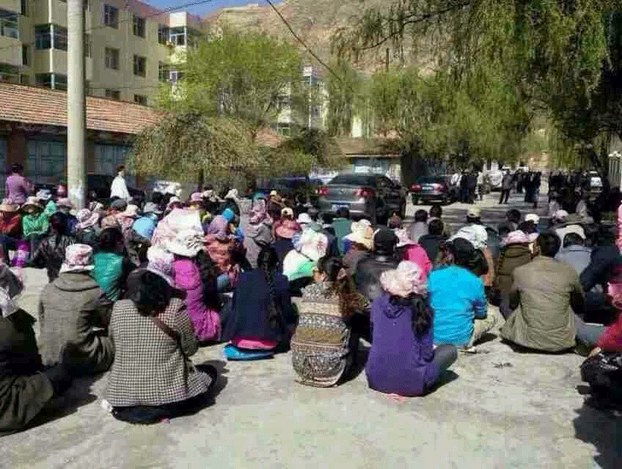




Over a hundred teachers protested this week outside government offices in a Tibetan prefecture of northwestern China’s Qinghai province to call for benefits and higher pay denied to them because of their status as contract employees, according to sources in the region.
The “substitute” teachers, mostly ethnic Tibetans but including some Han Chinese, complain that they are getting only up to one-sixth the salaries of full-time employees.
They gathered on April 30 outside Malho (in Chinese, Huangnan) prefecture offices and came mainly from Rebgong (Tongren) county and surrounding rural areas, one protester told RFA’s Tibetan Service.
“We have over 160 people here,” the source, speaking from the protest site, said on condition of anonymity.
“We are all high school graduates and are certified to work as teachers, and we want benefits and an increase in our pay,” he said.
'Underpaid'
Rebgong-area teachers hired as full-time employees receive from 3,000 to 5,000 yuan [U.S. $479 to U.S $799] per month in pay, along with promotions and medical care and other benefits, according to Tibetan sources with contacts in the region.
But under a local hiring scheme, an increasing number of teachers in area primary and middle schools have been employed in recent years as contractors, or “substitutes,” and are denied the compensation given to full-time teachers though they also perform full-time work, one Rebgong source said in an e-mail received by RFA.
“Substitute teachers who are assigned to do full-time teaching across the Rebgong area have been paid only 500 to 1,000 yuan [U.S. $80 to U.S. $160] per month over the last ten years,” the source said.
“They are also not entitled to receive any kind of benefit or other kind of compensation for their full-time work as teachers, so these underpaid ‘substitute teachers’ have now gone to appeal to the local government for a pay raise,” he said.
A growing problem
Sources say the teachers’ protest underscores a growing problem in Tibetan areas of China, where Han Chinese are frequently hired ahead of Tibetans and where facility in the Chinese language is often a requirement for promotion.
“Not just in Rebgong, but in all Tibetan areas, high school graduates are not finding jobs,” one local source said.
“Many young and educated Tibetans are currently facing problems finding good jobs,” another source said, adding that “most” graduates working even in county and other local government offices are hired only as temporary workers and receive low pay.
“They are not entitled to medical benefits or housing compensation, and in some offices they are made to work very hard, like servants,” he said.
Teachers have been among the many Tibetans jailed for asserting Tibetan national identity since widespread protests swept Tibet and the Tibetan-populated provinces of Sichuan, Qinghai, and Gansu in 2008. Others jailed include writers, artists, and singers.
Reported by Rigdhen Dolma, Chakmo Tso, and Lumbum Tashi for RFA’s Tibetan Service. Translated by Rigdhen Dolma. Written in English by Richard Finney.